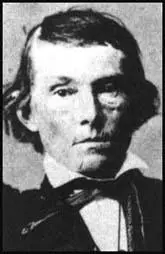Alexander Stephens

Alexander Hamilton Stephens was born in Crawfordville, Georgia, on 11th February, 1812. After graduating from the University of Georgia he taught in a local school. He studied law and was admitted to the bar in 1834.
Stephens joined the Whig Party and in 1836 he was elected to the Georgia House of Representatives. He served for five years before being elected to the 28th Congress and took his seat in October, 1843. He later joined the Democratic Party and was chairman of the Committee on Territories (1848-50). Stephens was a strong opponent of the Mexican War and was highly critical of President James Polk during this conflict.
An advocate of slavery, Stephens campaigned for the Kansas-Nebraska Act. He opposed the election of Abraham Lincoln but argued against immediate secession after the Republican Party victory. Lincoln wrote a letter to Stephens pointing out: "You think slavery is right and ought to be extended; while we think it is wrong and ought to be restricted. That I suppose is the rub. It certainly is the only substantial difference between us."
Over the next couple of months seven states seceded from the Union: South Carolina, Mississippi, Florida, Alabama, Georgia, Louisiana and Texas. Representatives from these seven states quickly established a new political organization, the Confederate States of America. On 8th February the Confederacy adopted a constitution and within ten days had elected Jefferson Davis as its president and Stephens as vice-president.
During the American Civil War Stephens did not enjoy a good relationship with Davis and later described him as "a weak timid aspirant for military domination". Stephens favoured peace negotiations whereas the president wanted to fight until the bitter end. Stephens made several attempts to talk with Abraham Lincoln about bringing the war to an end. Horace Greeley, editor of the New York Tribune, accused him of prolonging the war to satisfy his personal ambition. Others on the right, such as Clement Vallandigham, claimed that Lincoln was waging a "wicked war in order to free the slaves".
After the war Stephens was imprisoned in Fort Warren, Boston, for five months but was eventually pardoned by President Andrew Johnson. After the war Stephens wrote a two-volume book on the conflict: Constitutional View of the Late War Between the States (1868).
Alexander Hamilton Stephens was elected to the 43rd Congress and served from December, 1873 until his resignation in November, 1882. Elected as governor of Georgia in 1882, he served until his death in Atlanta, Georgia, on 4th March, 1883.
Primary Sources
(1) Abraham Lincoln was a great admirer of Alexander Stephens during the early part of his career. He expressed his views in a letter to his friend, William Herndon (2nd February, 1848)
I just take up my pen to say, that Mr. Stephens of Georgia, a little slim, pale-faced, consumptive man, with a voice like Logan's has just concluded the very best speech, of an hour's length, I ever heard.
(2) Abraham Lincoln, letter to Alexander Stephens (November, 1860)
You think slavery is right and ought to be extended; while we think it is wrong and ought to be restricted. That I suppose is the rub. It certainly is the only substantial difference between us.
(3) Alexander Stephens, Constitutional View of the Late War Between the States (1868)
I do not think that he (Abraham Johnson) intended to overthrow the institutions of the country. I do not think he understood them or the tendencies of his acts upon them. The Union with him in sentiment, rose to the sublimity of a religious mysticism, while his ideas of its structure and formation in logic, rested upon nothing but sophism.
